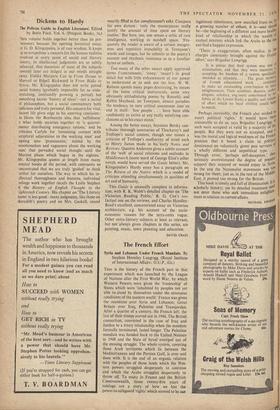The French Effort
THIS IS the history of the French part in that experiment which was launched by the League of Nations after the First World War, by which Western Powers were given the 'trusteeship' of States which were 'inhabited by peoples not yet able to stand by themselves under the strenuous conditions of the modern world.' France was given the mandates over Syria and Lebanon; Great Britain over Iraq, Palestine and Transjordan. After a quarter of a century, the French left; the last of their troops moved out in 1946. The British connection, converted in the case of Iraq and Jordan to a treaty relationship when the mandate formally terminated, lasted longer. The Palestine mandate was handed back to the United Nations in 1948 and the State of Israel emerged out of the ensuing struggle. The whole-system, covering those Arab territories which lie between the Mediterranean and the Persian Gulf, is over and done with. It is the end of an organic relation with the peoples of those lands which the Wes- tern powers struggled desperately to continue and which the Arabs struggled desperately to throw off. To many in France and the British Commonwealth, those twenty-five years of tutelage are a story of how we lost the power to safeguard 'rights' which seemed to be our legitimate inheritance, now snatched from us. 1.'1, a growing number of others, it is—and should be—the beginning of a different and more health kind of relationship in which the wealth of mutual interests which link the Arabs to the "51 can find a happier expression.
`There is exaggeration, often malice, in the charges commonly brought against the French effort,' says Brigadier Longrigg.
It is untrue that their system was one colonisation, and that they were insincere in accepting the burdens of a system specificall+' intended as altruistic. . . . The great nelw°1 of French educational work . . . continuo, to make an outstanding contribution to la' enlightenment. Their scientists, doctors, arch'" ologists, scholars, eng'neers contributed to 111' fabric of the Levant States a quality and volume of effort which no local abilities could hots to match.
Perhaps inevitably, the French also wished to assert political 'rights.' It would have bee,n reasonable to do so, says Brigadier Longrigg, .11 such were accepted as valid by a majority of lb.c people. But they were not so accepted, and !I was the Moral and logical weakness of the Frail position that it based a claim to political dominance on voluntarily given past services ok, a wholly different and unpolitical type. • • • Through error, 'perhaps self-deception,' they seriously overestimated the degree of poPol.°1 support they enjoyed or would enjoy in SYrta' In the end the Nationalist movement was too strong for them; just as, in the rest of the Middle
East, it proved too strong for the British. .,
This book is timely and full of illumination. PI] scholarly history; yet its detailed treatment nee' not deter those who seek immediate enlighten' ment in relation to current affairs. MICHAEL !ONO














































































 Previous page
Previous page